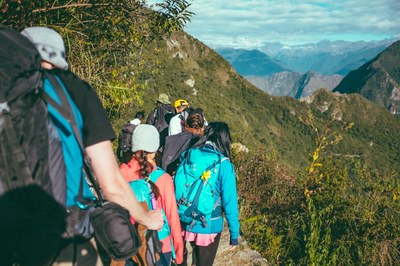
Hiking Course
Day Hiker School
Day Hiker School (DHS) is a school to teach outdoor skills for those who like to enjoy being in nature. It fulfills the prerequisites for WTS for other schools. DHS is taught on a hybrid basis. The classroom portion of the five modules is taught online with five in person field days. OPEN TO MEMBERS ONLY!
- Rolling Enrollment: Sat, Aug 6, 2022 - Tue, Dec 31, 2030
- Committee: Denver
- Members: $170.00
- Availability: 3 (190 capacity)
- Cancellation & Refund Policy
Day Hiker School (DHS) is for all who wish to learn skills for being in the wilderness. It is a segment-based program – combining online class and group work with in-person field days. The school is intended for ALL skill levels, from new hikers to experienced hikers who wish to brush up or fill holes in their skill set. The goal of DHS is to provide skills and create confidence when hiking in the beauty that is Colorado.
DHS teaches the foundational skills emphasized by the CMC. As such, DHS can be a substitute for Wilderness Trekking School (WTS) as the prerequisite requirement for the CMC’s more advanced or specific schools (mountaineering, backpacking, scrambling, and others). Also, it can be used to satisfy the WTS requirement on Hiker Classification Change Forms.
WHO SHOULD TAKE THIS CLASS
All CMC members, 18 and over, who intend to hike with CMC should take either this school or WTS. DHS is designed specifically for members whose life-style or work schedule does not allow for a commitment to the WTS intensive, multi-week in-class experience. Those who can make the WTS schedule work are encouraged to take WTS.
Topics covered in DHS include:
- The 10 (or more) essentials – what to pack and the best sources for gear.
- The overarching principles of backcountry safety and making risk vs. reward decisions when day-hiking.
- Techniques for both on and off trail hiking.
- Basic map & compass skills: orientation, navigation, and route-finding – these can be developed further in CMC’s advanced navigation classes.
- Weather – what to pack for Colorado’s changeable weather conditions.
- Nutrition and hydration – What to bring and how to prepare for a day hike.
- How to prepare for an unexpected overnight stay – skills that can be further developed in CMC’s Wilderness Survival School.
- Basic snow travel and avalanche awareness – these skills can be further developed in CMC’s dedicated avalanche schools.
- Leave No Trace concepts -- how to be a better backcountry citizen using low impact techniques.
- How to avoid, recognize and handle wildlife encounters.
- Knots – We will teach basic knots used for hiking – The Knot Tying School can build on this knowledge
The course consists of five segments –
- Dryland Travel – foundational hiking skills
- Map and Compass – Learning basic navigation skills
- Survival – What to do when things go wrong
- Snow – Self arrest and other basic skills for snow travel
- Graduation – Planning and preparing for a hike to a specific point
REQUIREMENTS
To graduate DHS, students must complete all five segments within two years from the end of the month they first register. Each segment consists of an online lecture, required reading material, and a quiz. Students must complete all of these items for each segment prior to signing up for the related in-field portion. The in-field portions will be available on the CMC calendar.
Please contact Mike O’Connor at mikeoc111@gmail.com or 303 933-3100 with any questions.
Badges you will earn:
This course has no scheduled activities.
The required equipment is the ten essentials, a compass, two ropes, a backpack, and hiking shoes and clothing. We will go through your equipment and make suggestions for improvement. You should not go out and purchase equipment prior to the first field day. Bring what you have and we will help you to make decisions to improve your equipment. The ten essentials are
1. Navigation - Map and Compass - Suunto MC-2 is the recommended compass. It available through the CMC website most of the time. You will need a compass with declination.
2. hydration - water and a way to purify water in the field.
3. extra food
4. extra layers of clothing
5. tool or repair kit
6. light source for night vision
7. shelter for spending the night in an emergency
8. fire starter
9. weather protection - rain or sun protection
10. first aid kit
You must register for this course to see course materials.

 Wilderness Trekking School
Wilderness Trekking School